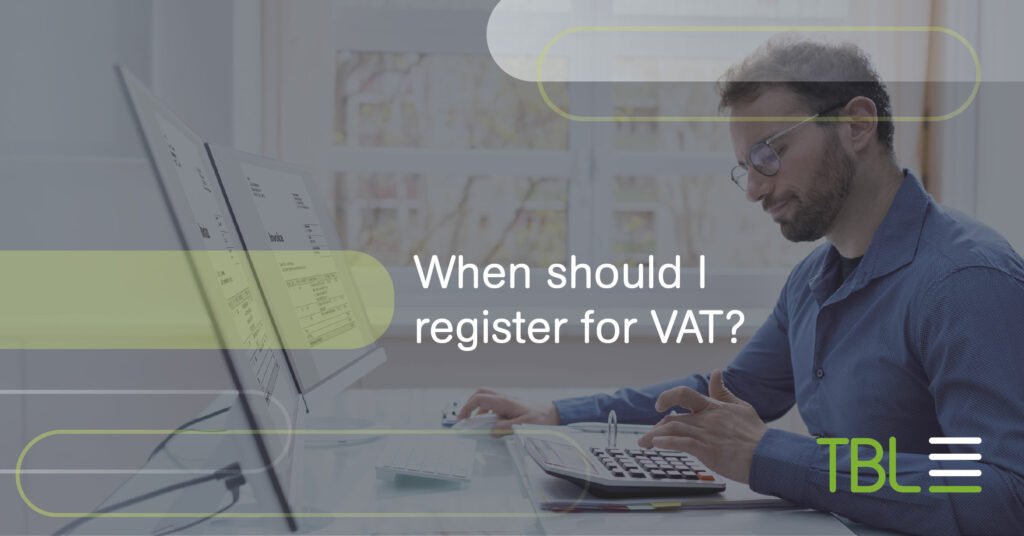It can be difficult to know when to register for VAT as a small or medium enterprise. To a point, the decision can be very personal to your business. It may be that registering for VAT is financially beneficial, or it may be that it’s simply not worth doing right now. There are also certain factors that will mean you are legally required to register. In this article, we are breaking down the pros and cons of VAT registration, when you’re required to register by law, and how to register your business for VAT.
If you own a business in Essex and are looking for support with your accounting, get in touch today to discuss how TBL can help you. You can contact the team here, or call our Southend office on 01702 466 886.
What is VAT?
VAT stands for Value Added Tax. This is a type of tax that is added to the consumption of goods and services. As a consumption tax, it is ultimately the responsibility of the final consumer, rather than a charge on businesses.
Charged as a percentage of the price of a product or service, the tax is visible at each stage in the production and distribution chain. Standard VAT is 20%, whilst the reduced rate of VAT is 5%.
In the UK, you need to register your business for VAT if your taxable turnover exceeds £85,000. Your VAT taxable turnover is the total value of everything you sell that’s not exempt from VAT. Exemptions include things like lottery tickets, postage stamps, health services, and certain financial services. But for most goods and services, VAT is applicable. You can work out your VAT taxable turnover using the gov.uk calculator.
When should I register for VAT?
If your business has an annual turnover of £85,000 or more, you are legally required to register for VAT.
However, if you are turning over less than this, you can still choose to voluntarily register. Registering for VAT means that you can reclaim VAT on your business purchases. If you pay more VAT than you collect from customers, reclaiming VAT can make up the difference and stop you from being responsible for what is designed to be a consumer tax.
Registering early also means that you won’t have to keep as close an eye on your turnover, and you’ll be ready for any growth or expansion of business.
The rules are also slightly different for businesses who provide digital services. The rules on paying VAT when supplying digital services to EU countries changed on 1 January 2021 with the end of the Brexit transition period. These services can include broadcasting, telecomms, music downloads, software and more.
Before this year, if your sales went over the £8,818 threshold, you had to register in each country where you were supplying services. Now, there is no threshold – meaning you have to charge VAT at the right rate for where your customer is based and declare those sales to the appropriate country.
Are there any drawbacks to registering for VAT?
VAT registration isn’t a simple process, so it’s worth considering whether it’s the right move for your business right now. VAT registration requires a lot of paperwork – and can sometimes end up with you paying more to HMRC rather than finding the move financially beneficial.
If you collect more VAT from customers than you pay out, for example, you will end up out of pocket.
It’s important to look at the specifics of your turnover and your business practices when you’re making this crucial decision. The move can have a huge impact on your finances, so it’s worth taking the time to discuss your options with a qualified accountant with experience working with SMEs.
What responsibilities do VAT registered companies have?
From the date of registration, you’ll be required to make sure you’re charging VAT correctly, as well as paying any VAT that is due. You’ll have to keep VAT records and submit a VAT return in the same way that you submit your tax return.
However, a trained accountant will be able to help tackle the paperwork so that you can focus more on providing your services and less on the financial complexities of business ownership. If you do employ an accountant, you’ll need to use a VAT accountant such as TBL.
How do I register for VAT?
You can register your business for VAT via post or online. Once registered, you’ll receive a registration certificate within 30 days and then you will be able to begin using your VAT number.
TBL Accountants are your local accountancy firm operating in Southend and across Essex. We specialise in a variety of services as personal, business, and charity accountants. Want to find out more? Get in touch with our team today.
Here for you.
